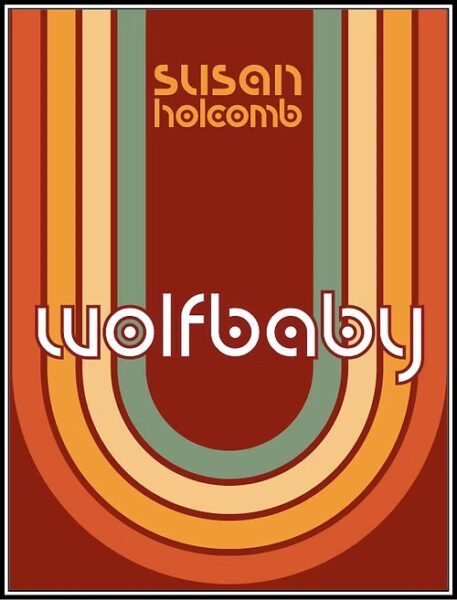
Reviewed by Gina Thayer
“Last night I lay awake and thought: how different might philosophy be if those who wrote it had thought they could get pregnant.” Susan Holcomb’s debut flash and microfiction chapbook Wolfbaby (The Cupboard Pamphlet, April 2025) opens with a gentle shove that sends the reader tumbling down a dreamlike tunnel of philosophy, myth, and rabid transformation. Scholarly musings grow ribs and teeth, and the unusual invades familial routine. Through deft, efficient prose, Holcomb explores the feral heat of pregnancy, motherhood, being, and the body, where “the only definitive answer [is]: the presence of blood.”
The women in Wolfbaby are mothers, daughters, untethered creatures. They are patients and phantoms, dream-figures, Capricorns. They analyze their worlds with sharp emotional intensity, translating the constant rattle of external forces within the cool confines of the private mind. A grandmother rips pages from her King James Bible and flushes them down the toilet. A mother scolds her daughter on the cooking of an omelet. Adam is absent in the Garden of Eden. Doctors, Instagram moms, and a chorus of dead bodies alike insist: “Your body will never be what it used to be.” With each entry, Holcomb presents tight vignettes of porous infinities — quotidian moments gone pulpy with surrealism. Physics and Shakespeare and quantum mechanics collide with Goldilocks, Dorothy, and Furbies shaped liked tombstones. “The important thing to know about Barbie heads,” Holcomb writes, “is that once they have been buried, they have a way of coming back. Next spring they will start to push out of the soil like turnips, their eyes all full of dirt, having been to subterranean places to look at all the things unseen.”
While some stories in Wolfbaby fully embrace speculation, others dwell at an uncanny threshold where the line between metaphor and reality is blurred, and the actuality of strangeness is steeped in doubt. “The important thing to know about speaking is you will only ever say one-tenth of what you mean,” Holcomb writes. Wolfbaby is full of interpretive potential, so the reader is left to gnaw at its meanings like a wolf pup with a bone. This is no accident. Holcomb’s writing style is precise. Every story is exacting in its ambiguity, and Holcomb’s brevity underscores, rather than impedes, the breadth and potential meaning of each piece. She wields the small to invoke the profound —story as an atom, or an embryo. A collection of cells. A building block.
As Wolfbaby grows, Holcomb employs repetition as both a theme and a structural tool. Repetition of daily rhythms, cycles of life, birth, aging, death. Cosmic cadences are juxtaposed against the mundane — a trip to the park, a dream inside a coffee shop, a teacher explaining facts in a sixth-grade classroom. Phrases repeat, both within and occasionally across stories. “They don’t get it. They don’t get it!” a mother mutters to herself. “The important thing to know about _____ is…” “Last night I lay awake.” “Last night I dreamed.” Through repetition, Holcomb ponders time’s presence in the body, its patterns of growth and mutation and decay. Her flash and microfiction become tiny sites of large-scale experiments, like fruit flies in a lab.
Holcomb separates her chapbook into two sections: I. “Wolfmother” and II. “Wolfbaby.” This could be viewed as a progression forward from mother to child, or as movement back in time — a mother returning to girlhood, adolescence, early adulthood. The aptly-titled “Course Catalogue” evokes this passage through a listing of college courses and (at times ominous) life lessons: “Philosophy of Science I. Distinguished Professors. Horny professors. Closed doors. Contemporary Moral Issues…” Time moves forward and back at once, suggesting both how we got here, and where we might be going.
Through each story, Holcomb presents isolation as a mental landscape, characters prowling a scene’s exterior, looking in. And while themes of motherhood are prominent, motherhood is never so much the singular, defining feature of Holcomb’s characters’ lives as it is a toothsome element of their complex existence. Humor counters the stern. Innocence and violence merge. “My daughter is a flying monkey wreaking havoc on all the neighborhood dogs,” Holcomb writes. And though her characters often find themselves in some way othered — detached from, or adjacent to, a shared existence — they are never truly alone. “[In] both realities the girl and I kept standing side by side, waiting for what would happen next.”
Wolfbaby contemplates feminism, science, and transformation. Holcomb reminds us of our animalistic natures — the raw and eerie and universal in us all. She is a writer who has confidence in her reader. Wolfbaby leaves crumbs for us to follow, and trusts that we will find our way, that the den is near, that the pack is waiting. After reading, we emerge from the tunnel where we, too, have looked at things unseen. We lick our teeth and sniff the air. We check for answers, for the presence of blood.
You can order Wolfbaby through The Cupboard Pamphlet website now.
____________________________
 Gina Thayer’s fiction has appeared in hex, Cotton Xenomorph, Barrelhouse, Sundog Lit, trampset, Five South, Lunch Ticket, and HAD, among others, and has been nominated for a Pushcart Prize and Best of the Net. She holds an MFA in writing from Vermont College of Fine Arts and is currently working on a collection of speculative stories. After several years in the Pacific Northwest, Gina now lives in Minneapolis with their partner and cat.
Gina Thayer’s fiction has appeared in hex, Cotton Xenomorph, Barrelhouse, Sundog Lit, trampset, Five South, Lunch Ticket, and HAD, among others, and has been nominated for a Pushcart Prize and Best of the Net. She holds an MFA in writing from Vermont College of Fine Arts and is currently working on a collection of speculative stories. After several years in the Pacific Northwest, Gina now lives in Minneapolis with their partner and cat.

 In September 2022 SmokeLong launched a workshop environment/community christened SmokeLong Fitness. This community workshop is happening right now on our dedicated workshop site. If you choose to join us, you will work in a small group of around 15-20 participants to give and receive feedback on flash narratives—one new writing task each week.
In September 2022 SmokeLong launched a workshop environment/community christened SmokeLong Fitness. This community workshop is happening right now on our dedicated workshop site. If you choose to join us, you will work in a small group of around 15-20 participants to give and receive feedback on flash narratives—one new writing task each week.